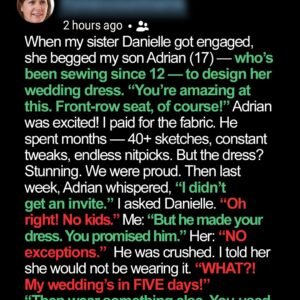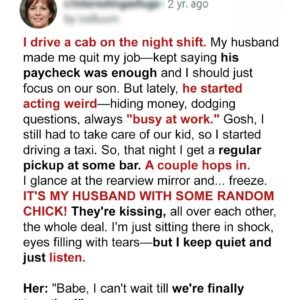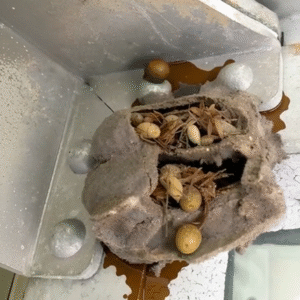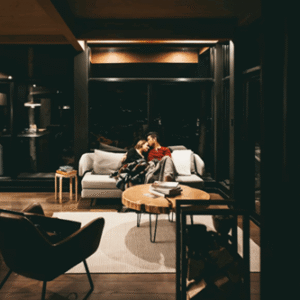When tragedy strikes at a young age, the people who step in to care for a child often shape the rest of their life. For me, losing both of my parents at just ten years old was devastating. What came next, however, was not the salvation it appeared to be. A couple from my church promised to care for me, but behind closed doors they exploited my grief, stole my inheritance, and treated me as little more than a charity case. What they didn’t know was that I was paying attention—and one day, I would turn the tables.
I was only ten when a hit-and-run accident claimed my parents’ lives. With no relatives to take me in, foster care seemed inevitable. That’s when David and Margaret, a couple from our church, stepped up. Before the congregation, they clasped hands and declared they had been “called by God” to give me a home. To everyone watching, it seemed like an act of generosity and faith. For me, it was the beginning of a very different reality.
Their house looked like something out of a magazine: two stories tall with crisp green shutters and a seasonal wreath on the door. Inside, their daughter Elise, just a year older than me, smiled politely. It should have felt safe, but the moment the church ladies left after dropping off casseroles, the warmth evaporated. Margaret’s tone hardened, her eyes sharpened, and I was quickly handed a list of rules. My room was upstairs. Dinner was at six. The bathroom was to remain spotless. The benevolent guardians the church admired disappeared the moment the door closed.
Publicly, they played the role of doting foster parents. David would pat my shoulder at church and talk about how “blessed” they felt to help me. Privately, he barely acknowledged me except to criticize my manners. Margaret scrutinized everything I did. And soon, I learned the real reason they had taken me in: money.
Only a month after I moved in, I overheard them whispering in the kitchen. “The state check arrived today,” Margaret said with glee. “And her father’s estate released the first payment from the trust. It’s more than we expected. Truly a blessing.” They spoke openly about using my inheritance for Elise’s future, new clothes, even a new car. When David asked what about me, Margaret brushed it off. “She has food, shelter, and guidance. That’s more than most orphans get.” That word—orphan—hit me like a knife. To them, I wasn’t a child grieving my parents. I was a source of income.
Over the years, the pattern deepened. Elise received a car at sixteen; I took the bus. She wore designer clothes; I got her castoffs. Family vacations to Florida and the Grand Canyon included everyone but me. Worse, Margaret helped herself to my mother’s belongings. My mom had run a small but respected antique shop, and after her death, everything was placed in storage until I was old enough to decide what to do with it. Margaret decided for me. She sold off pieces, decorated her home with others, and even earmarked my mother’s prized Baroque-era china set as a future wedding gift for Elise. That was the breaking point.
I cried into my pillow that night, but I also made a vow: I would not let them erase my parents’ legacy. Quietly, I began documenting everything. I pulled bank statements from the recycling bin, photographed letters from the trust, and built spreadsheets tracking every dollar. By the time I turned eighteen, I had a binder thick with evidence. More than $200,000 of my inheritance had funded their luxuries, their reputation, and their daughter’s future. Not once had they spent it on me.
When I finally gained access to what remained of my trust, David and Margaret had the audacity to ask me to “compensate them” for raising me. I simply smiled, knowing what they didn’t: I already had a lawyer. I had already secured college scholarships. And I had a plan.
The perfect opportunity came just before I left for college. Every year, our church held an antique sale, where Margaret and David were celebrated for their “generous donations.” Most of those donations had been stolen from my mother’s shop inventory. This time, the donation would come from me.
I carefully packed the entire Baroque china set—my mother’s most treasured possession—into boxes, drove them to the church, and presented them to the sale chairwoman. “This belonged to my mother,” I explained, handing over legal documents confirming my right to donate them. “I’d like the proceeds to support the building fund.” When the sale opened, Margaret’s face reportedly turned red as she saw the china displayed with her name listed as the donor. Her fury was legendary, but she was powerless.
A week later, my lawyer sent them a registered letter: a copy of my binder detailing every misused dollar, along with a warning that any attempt to contact me for money would result in legal action. I didn’t pursue a lawsuit, but I could have. That knowledge, combined with their destroyed reputation, was enough. The community that once praised them now whispered about how they had stolen from an orphan. Their carefully crafted image was gone forever.
Life moved on. I built a new future for myself—college, a teaching career, a loving husband, and two children who will never know what it’s like to feel unwanted in their own home. Ten years later, I received an unexpected message from Elise. She had started therapy and wanted to apologize for what she had allowed to happen. We met for coffee, and for the first time, I saw genuine remorse in her eyes. Healing came slowly, but it came. My children and hers eventually became friends, forming the family bonds I was denied as a child.
Today, in my classroom, I keep a single teacup from my mother’s china set in a shadow box above my desk. When students ask about it, I tell them it’s a reminder that justice doesn’t always come from a courtroom. Sometimes it comes from courage, persistence, and refusing to let others define your worth.
My foster parents tried to turn my tragedy into their blessing, but in the end, I reclaimed everything that mattered: my dignity, my voice, and my peace. They wanted me to be their charity case. Instead, I became the author of my own justice.




